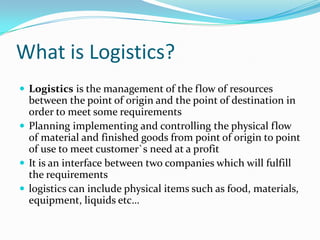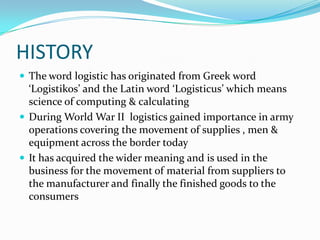Logistics presentation for acadamics
- 2. What is Logistics? ’éŚ Logistics is the management of the flow of resources between the point of origin and the point of destination in order to meet some requirements ’éŚ Planning implementing and controlling the physical flow of material and finished goods from point of origin to point of use to meet customer`s need at a profit ’éŚ It is an interface between two companies which will fulfill the requirements ’éŚ logistics can include physical items such as food, materials, equipment, liquids etcŌĆ”
- 3. Why Logistics? ’éŚ It allows for a smoother flow of company processes and procedures increase performance ’éŚ Brings profits to company ’éŚ Increases efficiency
- 4. Examples
- 5. HISTORY ’éŚ The word logistic has originated from Greek word ŌĆśLogistikosŌĆÖ and the Latin word ŌĆśLogisticusŌĆÖ which means science of computing & calculating ’éŚ During World War II logistics gained importance in army operations covering the movement of supplies , men & equipment across the border today ’éŚ It has acquired the wider meaning and is used in the business for the movement of material from suppliers to the manufacturer and finally the finished goods to the consumers
- 6. Part of SCM
- 7. SCM ’éŚ Supply chain management (SCM) is the management of a network of interconnected businesses involved in the provision of product and service packages required by the end customers in a supply chain ’éŚ Logistics is part of this SCM which plays an important role of capturing information from start of a process to end of the process
- 8. Logistics in different Areas ’éŚ Logistic recognizes that all the activities of material movement across the business process are interdependent and needs close coordination and these are to be maintained as a system and not the functional Silos. ’éŚ System is shown as logistic Mix including following functional Areas ’ü« Order Processing ’ü« Information Flow ’ü« Warehousing ’ü« Inventory control ’ü« Packaging ’ü« Transportation
- 9. Order Processing ’éŚ Technical details,price,delivery period,payment terms,taxes etcŌĆ” ’éŚ Checking the availability of material in stock ’éŚ Production & material scheduling for shortage
- 10. Information Flow ’éŚ It is basically information based activity of inventory movement across the supply chain ’éŚ This function is required to facilitate the following information needs ’éŚ Order Registration ’éŚ Order checking & editing ’éŚ Order processing ’éŚ Coordination means to integrate the total supply chain of the company with informational needs as to time ,quantity, value e.g Lead time, rate of consumption , delivery schedule & price of the material , Transportation time & cost etc.
- 11. Inventory management ’éŚ Minimum raw materials to make products ’éŚ It involvesŌĆ” ’éŚ How much to order ’éŚ When to order ’éŚ Purchase Control ’éŚ Stores control
- 12. Transportation ’éŚ Movement of goods from supplier to buyer ’éŚ Transportation is the most fundamental and important component of logistic ’éŚ It involves mainly inŌĆ” A. Mode of transportation B. Own fleet or Outsourcing C. Route Planning D. Vehicle scheduling
- 13. Warehousing ’éŚ A warehouse is a commercial building for storage of goods. Warehouses are used by manufacturers, importers, exporters, wholesalers, transport businesses, customs, etc. ’éŚ It involvesŌĆ”. A. Material Storage Function B. Material Handling Function C. Information Handling Function
- 14. Objectives of Logistic management ’éŚ Inventory Reduction ’éŚ Reliable and consistent delivery performance ’éŚ Freight economy ’éŚ Minimum product damage ’éŚ quick Response














